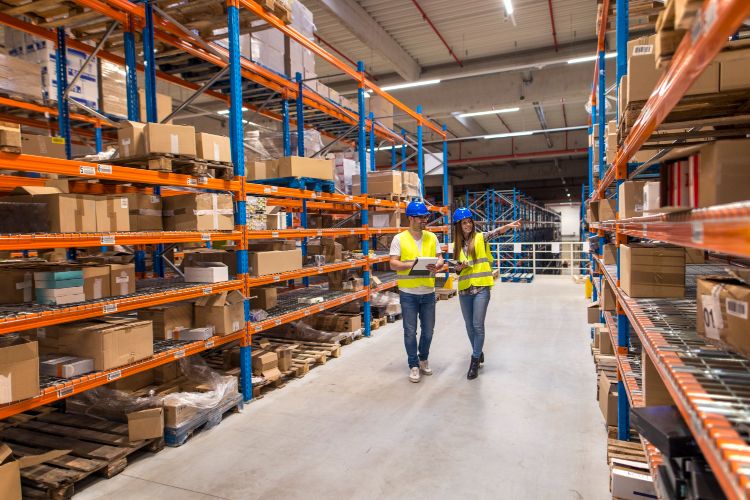
Running a successful warehouse is a difficult task that requires careful management of resources, efficient operations, and a strong emphasis on safety.
Safety rules are important for ensuring that warehouse operations run smoothly and effectively. They protect employees from accidents, safeguard inventory from damage, and help avoid costly disruptions.
Additionally, following safety rules ensures compliance with legal regulations, reduces financial losses, and boosts employee morale and productivity.
When employees are happy and healthy, they work harder and are more productive. Strong safety rules not only protect your workers but also improve your bottom line.
In this article, I will explain in detail why safety rules are important for running a successful warehouse.
Also, read this: 7 Best Google AdSense Alternatives

Enhancing Employee Well-being
One of the main reasons why safety rules are important to running a successful warehouse is to ensure the well-being of employees.
Warehouses are environments filled with potential hazards, including heavy lifting, operating machinery, and handling dangerous materials.
Without proper safety measures, the risk of accidents and injuries is high. Injuries not only affect the health of employees but also impact their morale and productivity.
By Implementing safety rules and providing comprehensive safety training and education, warehouses can create a safer working environment, thereby reducing the occurrence of accidents and enhancing overall employee well-being.
Legal and Regulatory Compliance
Legal and regulatory compliance in warehouse safety is very important, with rules set by authorities like the Occupational Safety and Health Administration (OSHA) to ensure worker safety.
These rules must be followed to avoid legal trouble, including big fines and possible shutdowns if safety isn’t met. Employees hurt in unsafe conditions can take legal action, leading to expensive lawsuits and claims for compensation.
Regular checks and audits are done to make sure rules are followed, and records are kept to show this. Proper training and education are given to make sure everyone knows and follows safety rules.
Ultimately, following safety regulations not only reduces legal risks but also makes the workplace safer for everyone and helps them work better.
Increasing Operational Efficiency
Safety rules play an important role in maintaining operational efficiency within a warehouse. Accidents can lead to significant downtime, disrupting the workflow and causing delays in operations.
For example, if an employee is injured while handling equipment, it could take hours or even days to resume normal operations.
By minimizing the risk of accidents, safety rules help ensure an uninterrupted workflow, which is important for maintaining high productivity levels.
Additionally, safety measures promote the efficient use of resources, such as proper handling and storage of materials, which further contributes to operational efficiency.
Financial Benefits
Implementing safety rules can lead to significant financial benefits for a warehouse. Accidents often result in considerable costs, including medical expenses, workers’ compensation, and the repair or replacement of damaged equipment.
By preventing accidents from occurring, safety rules play an important role in decreasing these expenditures. Additionally, ensuring a safe workplace environment can lead to reduced insurance premiums and improved insurance coverage options.
Insurance companies see warehouses that follow safety rules as safer. This means warehouses can pay less for insurance and get better coverage.
So, making and keeping safety rules helps warehouses avoid accidents and manage risks better. This makes warehouses more financially stable.
Enhancing Employee Productivity and Morale
A safe work environment is closely linked to higher employee productivity and morale. When employees feel safe, they are more likely to be satisfied with their jobs and motivated to perform well.
This positive work environment can lead to lower turnover rates, as employees are less likely to leave a workplace where they feel valued and protected.
Additionally, fostering a culture of safety encourages employees to actively participate in safety initiatives, further promoting a safe and productive workplace.
Protecting Inventory and Assets
Safety rules are also important for protecting the inventory and assets within a warehouse.
Proper storage techniques and safe handling procedures minimize the risk of damage to goods, ensuring that products remain in good condition and reducing losses.
Furthermore, regular maintenance of facilities and the use of safety equipment and technology help safeguard the warehouse infrastructure, preventing costly repairs and prolonging the lifespan of the warehouse assets.
Reputation and Customer Trust
A commitment to safety builds a positive business reputation. Customers and clients are more likely to trust and engage with businesses that prioritize the well-being of their employees or their products.
If a company has a bad safety record, it can lose clients and money. On the other hand, a strong safety record can be a great way to show that a company is reliable and cares about its responsibilities.
This helps attract more customers and keeps them happy. Overall, focusing on safety not only protects employees and products but also creates a positive image that is important for a business to succeed in the long run.
Conclusion
Safety is very important for running a successful warehouse. It not only ensures the safety and well-being of employees but also safeguards valuable inventory and contributes to overall operational efficiency.
When warehouses strictly follow safety protocols, they significantly reduce downtime caused by accidents or injuries, thereby maintaining a continuous workflow and maximizing productivity.
Furthermore, a strong commitment to safety helps in establishing a positive reputation within the industry and among customers, which is important for long-term growth and success.
By prioritizing safety rules, warehouses not only protect their workforce and assets but also create a conducive environment for sustainable business operations and development.

